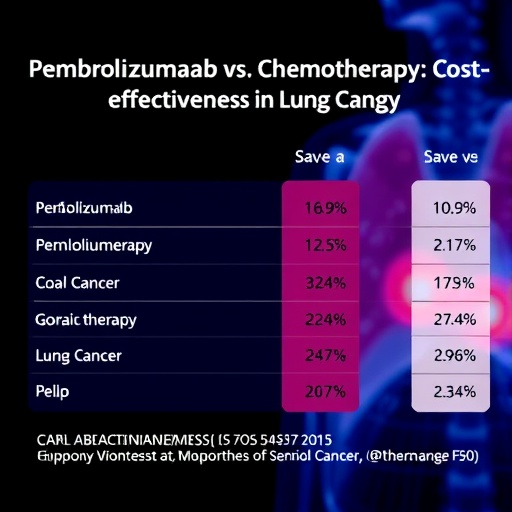Recent advancements in cancer treatment are poised to redefine patient care paradigms globally, particularly in emerging markets like China. A groundbreaking study published in the Journal of Cancer Research and Clinical Oncology has highlighted the efficacy and cost-effectiveness of pembrolizumab, a pioneering immunotherapy drug, in contrast to traditional chemotherapy for patients grappling with advanced non-small cell lung cancer (NSCLC). As lung cancer continues to be among the leading causes of cancer mortality worldwide, understanding treatment cost-effectiveness becomes paramount, especially within resource-constrained healthcare systems.
The study meticulously analyzed real-world data to assess pembrolizumab’s financial viability in the context of the Chinese healthcare landscape. A sacrificial pivot from conventional chemotherapy to pembrolizumab has raised crucial questions: Is the substantial cost of immunotherapy justifiable by its health benefits? The analysis sought to provide an evidence-based answer to this pressing inquiry, unlocking insights that could shape future healthcare policies and treatment options across similar demographics.
Within the study’s scope, the researchers utilized extensive patient databases and real-world evidence to juxtapose the clinical outcomes associated with each treatment type. This approach represents a notable departure from traditional clinical trials often constrained by strict inclusion criteria and controlled environments that may not accurately reflect the complexities of everyday patient care. By integrating patient experiences and outcomes from diverse real-world settings, the researchers aimed to paint a more holistic picture of treatment effectiveness.
Central to the evaluation were key performance indicators, including overall survival rates, quality of life, and the economic burden on patients and the healthcare system. Pembrolizumab has shown remarkable promise as a first-line treatment option, often leading to improved survival outcomes compared to standard chemotherapy regimens that are bogged down by debilitating side effects and shorter duration of efficacy. As healthcare costs continue to soar, understanding the long-term economic implications of these therapies becomes quintessential.
Cost-effectiveness analysis, often described as a balancing act between financial expenditures and health outcomes, revealed that pembrolizumab, while initially expensive, may provide substantial financial savings over time. This was particularly evident in patients experiencing prolonged survival and fewer hospitalizations, which can significantly reduce out-of-pocket expenses for patients and decrease hospitalization costs for healthcare systems. The researchers suggest that adopting pembrolizumab could not only enhance patient welfare but also alleviate financial strain on national healthcare budgets.
In evaluating the broader implications of these findings, the study highlights a critical need for policymakers and healthcare professionals to incorporate such real-world evidence into healthcare frameworks. The integration of immunotherapy into standard treatment protocols could initiate a seismic shift in lung cancer management in China, a country where the disease’s prevalence is alarmingly high. Creating a pathway for access to innovative treatments may not only facilitate better patient outcomes but could also stimulate advancements in therapeutic approaches.
Moreover, the demand for robust health technology assessment becomes imperative for a comprehensive understanding of the comparative effectiveness of new treatments. As innovative therapies enter the market at increasing rates, the onus is on healthcare systems to adapt to these changes while ensuring that economic implications do not overshadow clinical considerations. Insight derived from studies like this one provides a critical foundation for future evaluations of emerging therapies in a variety of therapeutic areas.
The methodological rigor employed in this analysis sets a precedent for future research efforts aimed at balancing innovation with economic sustainability. The researchers encompassed varied demographics, age groups, and co-morbid conditions, ensuring the findings resonate across a wide patient spectrum. In doing so, they have opened the door for similar investigations that might address other cancers or chronic diseases, thereby broadening the overall understanding of treatment dynamics within resource-limited contexts.
Public discourse surrounding cancer treatments often gravitates toward dramatic advancements, yet lacks nuance regarding the associated costs and their ramifications. By spotlighting the inherent trade-offs involved in healthcare decisions, this study encourages a more informed discussion among stakeholders, including patients, caregivers, and healthcare professionals. Enhanced public understanding can lead to more astute health decisions and a push for necessary reforms in healthcare policy and finance.
Taking a step back, the implications of the study transcend beyond just the realm of lung cancer. As healthcare professionals continue to grapple with balancing innovation and affordability, the lessons from this research may inform best practices for integrating immunotherapies and beyond into everyday clinical settings. It serves as a clarion call to reevaluate existing paradigms and embrace an evolving landscape fraught with opportunities for enhanced patient care.
Ultimately, the findings from this study reinforce the notion that patient-centered approaches must take precedence in resources allocation within healthcare systems. Pembrolizumab embodies a new wave of treatment options that aspire not only to improve survival rates but also to enhance the quality of life. As valuable insights accumulate from real-world applications, the hope is that cancer care becomes more accessible and equitable for all, regardless of socioeconomic status.
In conclusion, the cost-effectiveness analysis of pembrolizumab versus chemotherapy in advanced NSCLC establishes a crucial intersection between clinical efficacy and economic rationale. It challenges existing workflows and beckons a fresh perspective on treatment paradigms, encouraging global stakeholders to prioritize innovative therapies that possess the potential to transform patient outcomes amidst steep healthcare costs.
Subject of Research: Cost-effectiveness analysis of pembrolizumab versus chemotherapy in advanced non-small cell lung cancer in China.
Article Title: Cost-effectiveness analysis of pembrolizumab versus chemotherapy in advanced non-small cell lung cancer in China based on real-world studies.
Article References:
Wan, N., Yang, C., Wang, B. et al. Cost-effectiveness analysis of pembrolizumab versus chemotherapy in advanced non-small cell lung cancer in China based on real-world studies.
J Cancer Res Clin Oncol 151, 306 (2025). https://doi.org/10.1007/s00432-025-06242-6
Image Credits: AI Generated
DOI: 10.1007/s00432-025-06242-6
Keywords: pembrolizumab, chemotherapy, non-small cell lung cancer, cost-effectiveness, real-world studies, healthcare policy, patient outcomes.




